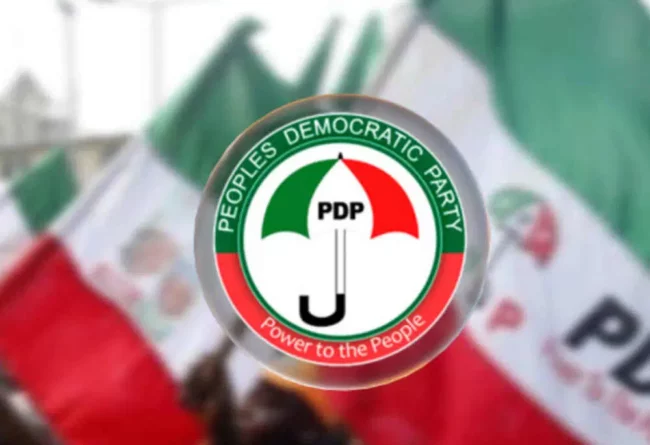The Peoples Democratic Party (PDP) is grappling with a deepening internal crisis, as tensions between key leaders spill over into Akwa Ibom, Plateau, Kebbi, and Cross River. At the heart of the storm are National Chairman Umar Damagum, National Secretary Samuel Anyanwu, and National Publicity Secretary Debo Ologunagba, each vying for control over the party’s direction ahead of 2027.
The conflict has turned state congresses into battlegrounds, exposing a fractured leadership at PDP’s Wadata Plaza headquarters. In Akwa Ibom, Damagum’s faction announced the dissolution of the State Working Committee (SWC), appointing Igwat Umoren to lead a caretaker committee, citing compromised party principles. Anyanwu swiftly countered, declaring the move “null and void” in a letter to state chairman Aniekan Akpan, insisting no formal National Working Committee (NWC) meeting authorized it.

In Plateau and Kebbi, the rift widened over congress scheduling. Damagum reportedly informed INEC that congresses in these states, along with Cross River, were postponed due to logistical issues. Anyanwu, however, issued a conflicting letter, asserting the congresses should proceed as planned, leaving delegates and INEC caught in the crossfire of contradictory directives.
Cross River saw the dispute turn public when the state chapter held a congress in Calabar, claiming a valid re-election. Ologunagba dismissed it as a “hallucination” and “carnival,” arguing the NWC had postponed the event. The state’s publicity secretary, Mike Ojisi, fired back, saying a mere social media chat among five NWC members couldn’t override the congress.
The root of the chaos lies in competing interpretations of the PDP Constitution (2017, as amended). Damagum’s camp leans on Article 35(a)(1), which empowers the NWC to implement National Executive Committee (NEC) decisions, arguing their resolutions—like postponements or caretaker appointments—are binding. Anyanwu’s faction, however, cites Article 36(2) and other clauses, insisting that decisions require the National Secretary’s validation and proper NWC procedures. Article 47(1) further complicates matters, barring dissolution of party organs without constitutional steps, while Article 31(3) underscores NEC resolutions’ supremacy, fueling the debate over legitimacy.

The fallout is straining the PDP’s cohesion. State chapters are paralyzed by conflicting orders, grassroots organizers are frustrated, and public trust in the opposition party is waning. The crisis risks delaying critical mobilization for future elections, with loyalty increasingly tied to factional allegiance rather than merit.
Two paths lie ahead: reconciliation through compromise, such as jointly signed congress schedules or transparent processes, could restore unity. Alternatively, unchecked factionalism could see the PDP splinter, with parallel structures and legal battles weakening its electoral prospects. As elders push for dialogue, the party’s ability to resolve this internal power struggle will shape its relevance in 2027 and beyond.




